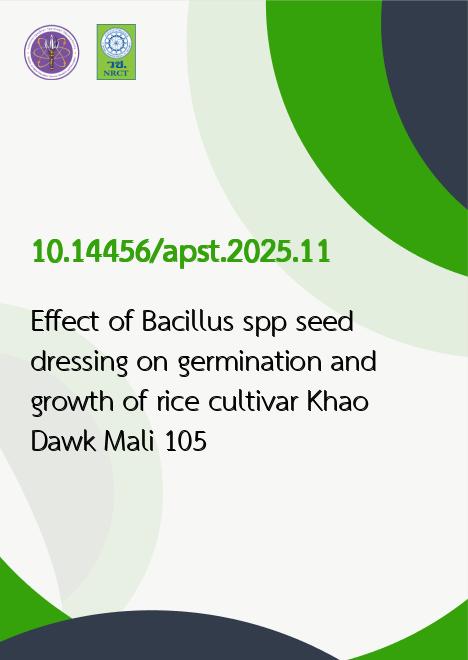
|
Effect of Bacillus spp. seed dressing on germination and growth of rice cultivar Khao Dawk Mali 105 |
|---|---|
| รหัสดีโอไอ | |
| Creator | Supatra Khamriang |
| Title | Effect of Bacillus spp. seed dressing on germination and growth of rice cultivar Khao Dawk Mali 105 |
| Contributor | Wantana Sinsiri, Naris Sinsiri, Suwita Saepaisan |
| Publisher | Asia-Pacific Journal of Science and Technology |
| Publication Year | 2568 |
| Journal Title | Asia-Pacific Journal of Science and Technology |
| Journal Vol. | 30 |
| Journal No. | 1 |
| Page no. | 11 (8 pages) |
| Keyword | Rice seed, Bacillus spp., Seeding vigor index, Seed dressing |
| URL Website | https://so01.tci-thaijo.org/index.php/APST/ |
| Website title | https://so01.tci-thaijo.org/index.php/APST/article/view/273334 |
| ISSN | 2539-6293 |
| Abstract | In Thailand, the Khao Dawk Mali 105 rice cultivar is particularly susceptible to dirty panicle disease, which severely impacts yield and quality. Farmers often resort to intensive fungicide use to manage this issue, leading to suboptimal grain quality and potential health risks from chemical residues. Consequently, there is a need for sustainable alternatives to improve seed quality and disease resistance. This research explores the potential of Bacillus spp. as a biocontrol agent and plant growth promoter to address these challenges. The study employs a Completely Randomized Design (CRD) with four replications and six treatments, including one control (water) and five Bacillus isolates (SR-SHP19, SK-KH3, BR-BD12, SK-KK4, UBU-1). These Bacillus isolates used to coat Khao Dawk Mali 105 rice seeds. Experimental conditions were maintained at 28 ± 2°C. The results indicate that Bacillus treatments significantly improved seedling vigor, particularly in 7-day-old seedlings. Isolates SK-KK4 and SK-KH3 were especially effective, enhancing biochemical composition with higher levels of sugars, free amino acids, chlorophyll, and carotenoids compared to the control. While overall germination rates were not significantly different, the improvements in seedling vigor and biochemical properties are promising for rice cultivation. Bacillus spp. seed dressing offers a viable alternative to chemical fungicides, potentially reducing environmental impacts and health risks. Bacillus treatments promote stronger and more resilient plants capable of withstanding disease and environmental stress, aligning with sustainable agricultural practices. Further research is necessary to optimize Bacillus spp. applications in field conditions which will ultimately contribute to improved rice production and food security. |
